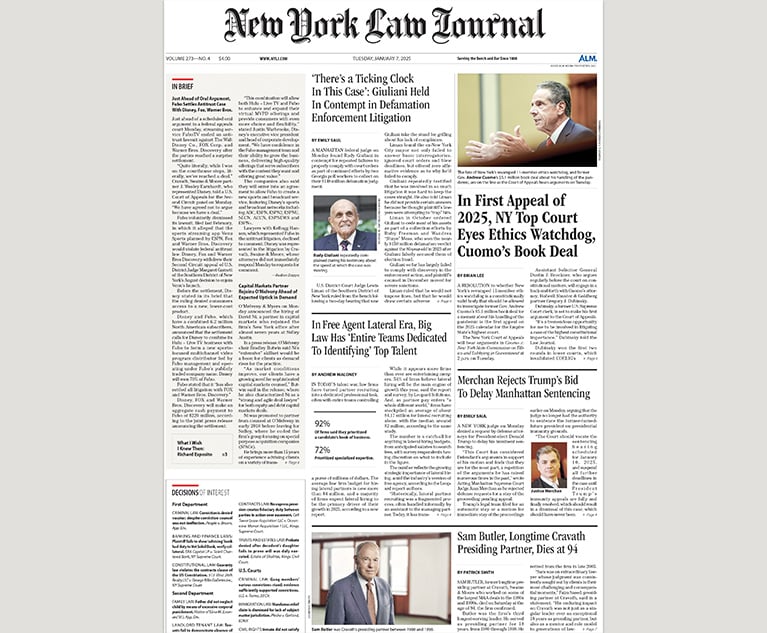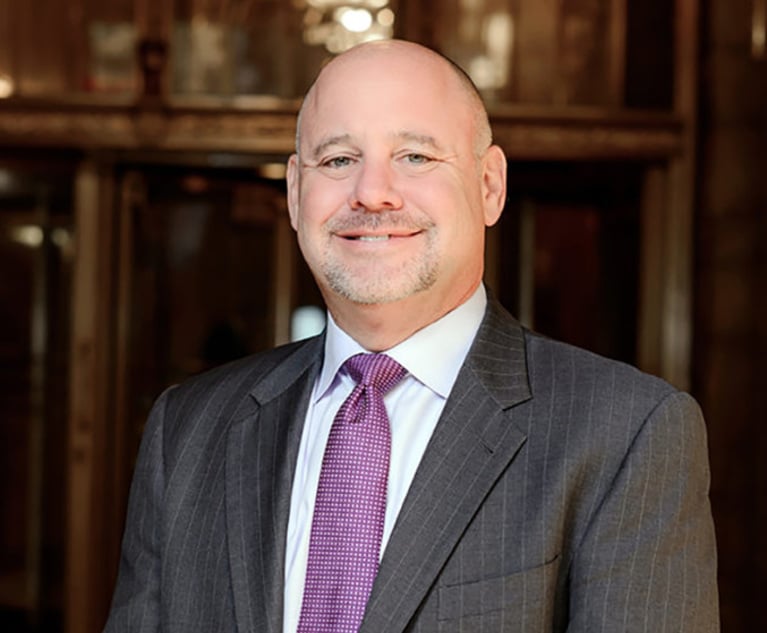 U.S. Bankruptcy Court for the Southern District of New York.
U.S. Bankruptcy Court for the Southern District of New York.NY Litigator, Accusing Lender of Coup, Loses Control of His Law Firm
A bankruptcy judge placed employment litigator Jeffrey Liddle's firm in the hands of a Chapter 11 trustee Thursday.
December 19, 2019 at 06:13 PM
4 minute read
Employment litigator Jeffrey Liddle's law firm was put in the hands of a Chapter 11 bankruptcy trustee Thursday after his adversaries argued that he was taking too long to close the firm.
U.S. Bankruptcy Judge Sean Lane of the Southern District of New York made the appointment during a lengthy hearing, following accusations by Liddle that lender Counsel Financial had tried to engineer a forced marriage of his firm with Milberg.
Both Liddle and his firm, Liddle & Robinson, filed for Chapter 11 earlier this year after Counsel Financial took steps to seize the proceeds of the sale of a Fifth Avenue apartment that he owned with his wife. In recent weeks, Counsel Financial, the U.S. trustee and former Liddle & Robinson partner Blaine Bortnick have all pushed to convert his company's case to a Chapter 7, with the U.S. trustee proposing a Chapter 11 trustee as a fallback.
Liddle's adversaries said his partnership was a legal nullity because he was the only remaining partner, and said the only thing it could do was wind down. At Thursday's hearing, David Wander of Davidoff Hutcher & Citron, who represents Counsel Financial, said Liddle's claims to have taken on new clients and done good business flew in the face of that plan.
In court papers earlier this week, Liddle said he should remain in control of his firm because he was the best equipped to run it and to pursue claims against his former partners and against Counsel Financial. He said in an affidavit, supported with an accountant's analysis, that Counsel Financial's loans were so onerous as to amount to equity, and said that the lender tried to force him to transfer his cases to another of its borrowers, the class action firm Milberg, and scuttled his effort to merge with Pierce Bainbridge Beck Price & Hecht.
In affidavits, R. Glenn Phillips of Milberg and a consultant who worked with Pierce Bainbridge disputed Liddle's version of events.
Pleading for the parties to embrace the holiday spirit of "peace and tranquility," Lane asked them at Thursday's hearing to focus solely on the legal arguments for and against the conversion of the case to Chapter 7 or the appointment of a Chapter 11 trustee.
"I am going to steer this hearing away from any lengthy recitations of grievances," he said. "Insults to one's honor no doubt require a response, and I don't need anyone to defend their honor to me."
Wander initially told the judge that he had proposed a settlement that would entail converting Liddle & Robinson's bankruptcy to a Chapter 7 and having Liddle create a new law firm that would take on his old firm's cases and continue to borrow from Counsel Financial. Andrea Schwartz of the U.S. Trustee's Office, in turn, said the cases had been dragging on long enough already. Among other case law, she invoked the case of Shea & Gould as precedent for a Chapter 11 trustee being appointed.
After an adjournment, the parties still hadn't reached a deal. Liddle's lawyer, William Gray of Foley Hoag, said he had briefly discussed the parameters of a trustee's oversight with Schwartz, but the trustee's representative said she couldn't make any agreement that would tie the trustee's hands beyond what was allowed in law.
Lane ended up appointing a Chapter 11 trustee to take control of Liddle & Robinson. Whether Liddle started a new firm or not was up to him, the judge said.
The spirit of peace and tranquility began to slip by day's end. While Bortnick, who is now at the firm Rasco Klock, was able to hash out the contours of an agreement to retrieve the contents of his old inbox on Liddle & Robinson's servers, the judge had a heated exchange with Wander about his opposition to allowing certain payments to be made to Foley Hoag.
"It is frustrating, and I think value-destructive in the sense that we've spent a lot of money fighting over things that we don't have to fight about in most of my other big 11s," the judge said.
Wander said after the hearing that he was satisfied with the outcome.
"Counsel Financial feels vindicated today that all of the baseless allegations attacking its loans have been shown to be false," he said. "We gave the court a full record with documentary evidence, with affidavits, that showed that these were bona fide proper loans."
Liddle declined to make a statement.
This content has been archived. It is available through our partners, LexisNexis® and Bloomberg Law.
To view this content, please continue to their sites.
Not a Lexis Subscriber?
Subscribe Now
Not a Bloomberg Law Subscriber?
Subscribe Now
NOT FOR REPRINT
© 2025 ALM Global, LLC, All Rights Reserved. Request academic re-use from www.copyright.com. All other uses, submit a request to [email protected]. For more information visit Asset & Logo Licensing.
You Might Like
View All
DLA Piper NY Office Adds Ex-Verizon GC As Big Law Goes on In-House Hiring Spree

Law Firms Mentioned
Trending Stories
Who Got The Work
Michael G. Bongiorno, Andrew Scott Dulberg and Elizabeth E. Driscoll from Wilmer Cutler Pickering Hale and Dorr have stepped in to represent Symbotic Inc., an A.I.-enabled technology platform that focuses on increasing supply chain efficiency, and other defendants in a pending shareholder derivative lawsuit. The case, filed Oct. 2 in Massachusetts District Court by the Brown Law Firm on behalf of Stephen Austen, accuses certain officers and directors of misleading investors in regard to Symbotic's potential for margin growth by failing to disclose that the company was not equipped to timely deploy its systems or manage expenses through project delays. The case, assigned to U.S. District Judge Nathaniel M. Gorton, is 1:24-cv-12522, Austen v. Cohen et al.
Who Got The Work
Edmund Polubinski and Marie Killmond of Davis Polk & Wardwell have entered appearances for data platform software development company MongoDB and other defendants in a pending shareholder derivative lawsuit. The action, filed Oct. 7 in New York Southern District Court by the Brown Law Firm, accuses the company's directors and/or officers of falsely expressing confidence in the company’s restructuring of its sales incentive plan and downplaying the severity of decreases in its upfront commitments. The case is 1:24-cv-07594, Roy v. Ittycheria et al.
Who Got The Work
Amy O. Bruchs and Kurt F. Ellison of Michael Best & Friedrich have entered appearances for Epic Systems Corp. in a pending employment discrimination lawsuit. The suit was filed Sept. 7 in Wisconsin Western District Court by Levine Eisberner LLC and Siri & Glimstad on behalf of a project manager who claims that he was wrongfully terminated after applying for a religious exemption to the defendant's COVID-19 vaccine mandate. The case, assigned to U.S. Magistrate Judge Anita Marie Boor, is 3:24-cv-00630, Secker, Nathan v. Epic Systems Corporation.
Who Got The Work
David X. Sullivan, Thomas J. Finn and Gregory A. Hall from McCarter & English have entered appearances for Sunrun Installation Services in a pending civil rights lawsuit. The complaint was filed Sept. 4 in Connecticut District Court by attorney Robert M. Berke on behalf of former employee George Edward Steins, who was arrested and charged with employing an unregistered home improvement salesperson. The complaint alleges that had Sunrun informed the Connecticut Department of Consumer Protection that the plaintiff's employment had ended in 2017 and that he no longer held Sunrun's home improvement contractor license, he would not have been hit with charges, which were dismissed in May 2024. The case, assigned to U.S. District Judge Jeffrey A. Meyer, is 3:24-cv-01423, Steins v. Sunrun, Inc. et al.
Who Got The Work
Greenberg Traurig shareholder Joshua L. Raskin has entered an appearance for boohoo.com UK Ltd. in a pending patent infringement lawsuit. The suit, filed Sept. 3 in Texas Eastern District Court by Rozier Hardt McDonough on behalf of Alto Dynamics, asserts five patents related to an online shopping platform. The case, assigned to U.S. District Judge Rodney Gilstrap, is 2:24-cv-00719, Alto Dynamics, LLC v. boohoo.com UK Limited.
Featured Firms
Law Offices of Gary Martin Hays & Associates, P.C.
(470) 294-1674
Law Offices of Mark E. Salomone
(857) 444-6468
Smith & Hassler
(713) 739-1250








